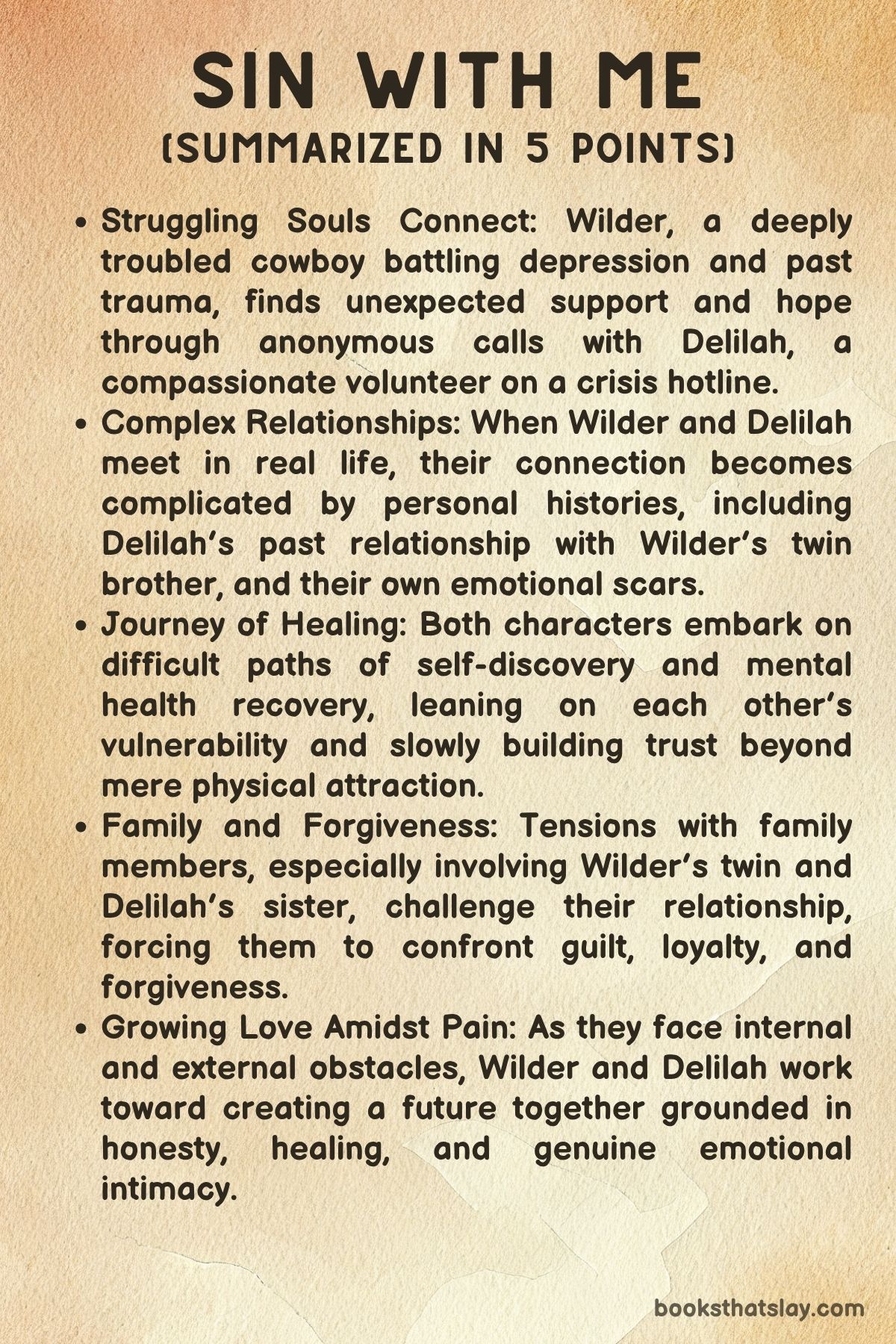Sin With Me Summary, Characters and Themes
Sin with Me by Brooke Montgomery is a contemporary romance novel that explores the emotional and psychological intricacies of relationships, self-doubt, and healing. The story follows Wilder Hollis and Delilah, two individuals with complex pasts who find themselves caught in an unexpected marriage after a drunken Vegas wedding.
As they navigate the challenges of their new life together, they confront their emotional baggage, personal struggles, and the evolving dynamics between them. The narrative captures their journey toward self-discovery, trust, and love, set against a backdrop of personal growth and difficult decisions.
Summary
The story begins with Wilder Hollis, a man dealing with the aftermath of a traumatic childhood and a complicated past, trying to manage his emotions and relationships. His struggles with anger, guilt, and emotional isolation have shaped his adult life, making it difficult for him to form meaningful connections.
However, everything changes when he meets Delilah, a woman who volunteers at a crisis hotline. Delilah provides him with support and a listening ear during his darkest moments, and their phone calls slowly evolve into something deeper.
Wilder, despite his reservations, begins to open up to Delilah. He battles with alcoholism and depression, often using humor and charm to mask his true feelings.
Yet, Delilah’s empathy and patience help him start to confront his issues, though he remains hesitant to fully embrace the help she offers. Over time, their relationship grows, with Wilder developing feelings for Delilah, although he is initially reluctant to admit it to himself.
Delilah, dealing with her own grief after the death of her father, finds herself becoming attached to Wilder as well. This shared vulnerability draws them closer, and they begin to develop a co-dependent dynamic where they lean on each other for emotional support.
As their relationship deepens, Wilder’s self-destructive behaviors intensify. He makes poor decisions, getting drunk and making impulsive choices, yet Delilah remains a steady presence in his life.
She encourages him to seek help, and despite his initial resistance, he begins to take steps to better his mental health. However, the pressure of their growing connection weighs on both of them.
Wilder’s internal conflict about his worthiness of love and Delilah’s struggle with her unresolved grief create tension in their dynamic.
The turning point comes when Wilder’s feelings for Delilah become undeniable. He realizes he is in love with her, but his fear of being rejected and his guilt over past mistakes hold him back.
When they finally meet in person, Wilder’s deception about using a fake name during their phone calls creates a rift between them. Despite this, their bond remains strong, and they continue to navigate their complicated emotions.
Meanwhile, Delilah is also struggling with her feelings for Wilder. She has always kept a certain emotional distance, especially because of her past involvement with Wilder’s twin brother, and is unsure whether she is ready to let go of her reservations.
The sexual tension between them escalates, leading to a passionate kiss that turns into a night of intimacy. However, both characters remain uncertain about the future of their relationship, with Wilder hesitant to commit emotionally and Delilah fearful of repeating her past mistakes.
The story takes a surprising turn when Wilder and Delilah, in a moment of spontaneous passion, drunkenly marry in Las Vegas. This impulsive decision leaves them both reeling as they try to navigate the consequences of their marriage.
Neither of them is entirely sure of what they want from the other, but the intensity of their connection pushes them to explore the possibility of building a future together. They agree to a 30-day trial period, during which they will test the strength of their relationship.
As they spend more time together, their emotional connection deepens. Wilder, who has always struggled with emotional intimacy, is determined to prove that he can be the partner Delilah deserves.
He begins to make changes in his life, distancing himself from casual flings and focusing on building something real with her. Delilah, too, finds herself opening up more, though she remains cautious about fully embracing her feelings for Wilder.
Their relationship continues to evolve as they face external challenges and confront their pasts. Delilah’s wedding plans with Wilder complicate when she becomes involved in a dangerous situation involving Jonah, a man from her past.
Jonah, who has become increasingly unstable, kidnaps Delilah, setting off a series of events that lead to a life-threatening encounter. Wilder, along with Delilah’s friends, embarks on a desperate search to find her, unaware of the perilous situation she is in.
As Delilah struggles to stay alive, she tries to keep Jonah calm while simultaneously seeking a way to escape. The tension escalates when Jonah throws her phone out the window, preventing her from alerting anyone to her whereabouts.
Just as she begins to lose hope, Delilah manages to cause the truck to crash, knocking herself unconscious. Wilder and his friends find the wreckage, but Delilah is missing.
The situation becomes even more dire when Delilah is taken by Jonah’s accomplice, Wesley, who has his own violent agenda. Wesley forces Delilah to assist in the delivery of a baby, threatening her life and that of the newborn.
Despite the grave danger, Delilah remains determined to protect the mother and child. After a harrowing labor, Delilah helps deliver a healthy baby girl, but the threat from Wesley continues to loom.
Wilder, who is frantic with worry, eventually finds Delilah and rescues her from Wesley’s clutches. Though physically and emotionally exhausted, Delilah is taken to the hospital, where she begins to recover from her ordeal.
Wilder and Delilah’s relationship, now tested by life-threatening circumstances, enters a new phase. The trauma they have both experienced—along with the emotional scars they carry—remains a significant part of their journey, but they now have a deeper understanding of one another.
Amid the chaos, Delilah finds herself unexpectedly pregnant, a development that brings both joy and stress. Wilder and Delilah, now more united than ever, face the challenges of their complicated lives and the potential of a future together, one built on trust, healing, and the strength they’ve found in each other.

Characters
Luke
Luke is a man who has lived most of his life weighed down by depression, self-doubt, and a destructive spiral of addiction and self-harm. His emotional landscape is one of isolation, where he struggles to accept love or care from others, often deflecting his deep-seated issues through humor and charm.
He is reluctant to fully open up to anyone, even Delilah, the woman who offers him solace through the crisis hotline. Despite his challenges, Luke gradually comes to realize that his mental health and self-worth are deeply tied to the relationships he fosters, especially his connection with Delilah.
This shift from complete emotional shutdown to acknowledging the importance of emotional intimacy is a major part of his journey. While he continues to battle his demons, including alcoholism, and wrestles with feelings of guilt and shame, Luke shows signs of growth as he learns to take responsibility for his actions.
His fear of hurting Delilah is a major obstacle, yet, his love for her becomes an undeniable force in his life, marking the turning point in his recovery. Luke’s emotional arc, defined by his increasing self-awareness and willingness to accept help, underscores the themes of healing, vulnerability, and the power of human connection in Sin with Me.
Delilah
Delilah is the embodiment of kindness and patience, with a deep sense of empathy that makes her an exceptional volunteer at a crisis hotline. However, her own emotional burdens, particularly the unresolved grief over her father’s death, weigh heavily on her throughout the story.
She is caught between the desire to be strong for others and the need to confront her own vulnerabilities. Her connection with Luke is complex, evolving from simple empathy into something deeper, as she begins to care for him more than she anticipated.
Delilah’s ability to provide emotional support while balancing her own grief speaks to her inner strength. Yet, her vulnerability often manifests in her relationships, particularly with Luke.
As their bond deepens, Delilah must navigate her own emotional barriers and confront her attraction to Luke, all while trying to protect herself from the potential heartache of getting too close. Her evolving feelings for Luke highlight the tension between self-protection and emotional openness, making her journey one of personal healing and self-discovery.
Delilah’s role as a healer, not just for Luke but also for herself, makes her a crucial force in the story, illustrating the transformative power of compassion and emotional connection.
Wilder
Wilder Hollis is a man defined by his anger and complex emotional history. At the start of Sin with Me, his internal turmoil manifests in impulsive actions, such as the altercation with Officer Wesley, and a reckless lifestyle filled with fleeting relationships and destructive coping mechanisms.
Wilder’s grief over his father’s death has left him emotionally stunted, unable to process his feelings in a healthy way. His relationship with Delilah becomes a source of emotional complexity, where he oscillates between moments of tenderness and emotional distance.
Despite his rough exterior and hesitation to embrace emotional commitment, Wilder begins to understand the value of genuine connection, especially with Delilah. His protective instincts towards her, combined with his struggle to maintain control over his own emotions, demonstrate his internal conflict between the desire for intimacy and the fear of vulnerability.
Throughout their developing relationship, Wilder’s character is marked by an earnest desire to change and to prove himself capable of deeper emotional connection, especially after their unexpected marriage. His journey of growth is central to the narrative, as he works through his anger, guilt, and emotional isolation, ultimately becoming more open and willing to embrace his connection with Delilah.
Jonah
Jonah’s character arc is marked by his erratic behavior and inner turmoil, which ultimately leads to his betrayal of Delilah. Initially, Jonah appears as a relatively stable figure, but as the story progresses, his actions grow increasingly unpredictable, particularly after being manipulated by Wesley.
His abduction of Delilah demonstrates his desperation and instability, as he loses control of his emotions and actions. Jonah’s relationship with Delilah is strained due to his internal conflicts, and his inability to deal with his own emotional baggage sets off a chain of events that leads to further harm.
His actions reveal a man struggling with guilt, anger, and manipulation, which cloud his judgment and endanger those around him. Jonah’s character serves as a tragic figure, one whose personal demons ultimately lead him down a destructive path, where his betrayal and erratic behavior jeopardize not only his relationship with Delilah but also his own moral compass.
Wesley
Wesley, a former police officer struggling with PTSD, is a volatile and manipulative character who creates a sense of fear and danger throughout the narrative. His emotional instability and manipulative tactics, particularly toward Delilah, make him a deeply antagonistic force.
Wesley’s abusive nature and his ability to coerce others, such as Jonah and Delilah, reflect his inability to process his own trauma in a healthy manner. His involvement in Delilah’s abduction and the violent situations that follow highlights his unpredictability and lack of empathy.
Despite the clear emotional manipulation, Wesley is not a one-dimensional villain; his backstory of trauma and PTSD provides a more complex understanding of his behavior, showing how deeply unresolved mental health issues can lead to destructive actions. Wesley’s character underscores the tension between vulnerability and aggression, showing the dangers of unchecked emotional instability and the lengths a person can go to when they feel desperate for control.
Themes
Emotional Vulnerability and Healing
The story of Sin with Me delves deeply into the themes of emotional vulnerability and the complex process of healing. Both Wilder and Delilah are characters marked by emotional scars from their pasts, each dealing with their personal struggles.
Wilder, with his history of self-destructive behavior and deep emotional isolation, is initially hesitant to open up to anyone, even Delilah, despite the connection they share. His mental health struggles, including depression, anger, and guilt, shape his actions and decisions throughout the story.
Delilah, on the other hand, carries the weight of grief and emotional baggage stemming from the loss of her father, adding another layer of complexity to her character. Their relationship, built on trust and emotional vulnerability, allows both characters to explore their pain and begin the healing process.
As the narrative unfolds, both Wilder and Delilah gradually confront their issues, learning to be open with each other. The way they both struggle to let go of past traumas—be it Wilder’s avoidance of emotional commitment or Delilah’s fear of letting herself fully care for him—highlights the difficulties in overcoming past hurts and accepting vulnerability in relationships.
The story reveals that true healing often requires opening up to others and allowing them to provide support, even when that support may not immediately feel comfortable or easy to accept.
Self-Worth and Emotional Growth
Another key theme in Sin with Me is the journey of self-worth and emotional growth. Both Wilder and Delilah must face their own self-perceptions and work to redefine their values and identities.
For Wilder, this theme manifests through his constant battle with self-doubt and feelings of unworthiness, which stem from his past actions, his troubled family life, and his struggles with depression and alcoholism. His relationship with Delilah pushes him to confront these issues, making him realize that his value is not defined by his mistakes or his inability to form healthy emotional connections in the past.
Similarly, Delilah’s emotional growth comes from her struggle to let go of her grief and guilt over her father’s death and her desire to protect herself from potential heartache. Her connection with Wilder forces her to examine her own fears and to find the strength to be emotionally present for someone else, even if it means risking her own vulnerability.
The theme of self-worth is explored through both characters’ emotional growth, as they learn to embrace their flaws, acknowledge their worth, and begin to believe in their ability to change for the better. This theme is central to the book, as it emphasizes the power of love and connection in transforming self-doubt into self-acceptance.
Trauma and Coping Mechanisms
Sin with Me also examines how trauma shapes behavior and the various coping mechanisms people adopt in the face of emotional pain. Wilder’s past is filled with emotional scars, from the death of his father to his history of unhealthy relationships and destructive coping strategies like alcohol abuse and casual flings.
His inability to cope with his emotions in a healthy way creates significant challenges in his relationship with Delilah, as his anger and guilt often cloud his ability to be emotionally available. Delilah, though not immune to her own trauma, adopts a more controlled and reserved approach to managing her grief, but her internal struggle with unresolved pain plays out through her relationship with Wilder.
Both characters find that their coping mechanisms—whether through humor, distance, or avoidance—only serve to mask the deeper issues they face. The story unfolds as both characters confront these coping mechanisms and begin to explore healthier ways to process their emotions.
Wilder’s journey of self-improvement is particularly marked by his decision to quit drinking and take responsibility for his actions, showing that healing from trauma often involves confronting and breaking free from old habits. The book highlights the long and challenging road to overcoming trauma, emphasizing that it requires time, patience, and the support of others to truly heal.
Love and Connection
Love is a central theme in Sin with Me, not just in the romantic sense but also in terms of human connection and the ways in which people help each other heal. The bond that forms between Wilder and Delilah is not built on idealized notions of romance but on a shared understanding of pain and a mutual need for emotional support.
Their relationship evolves from an initial physical attraction to a deeper emotional connection, where both characters gradually let go of their walls and allow themselves to be truly seen. Love, in this context, is not an instant cure but a slow, transformative force that encourages both Wilder and Delilah to face their fears and vulnerabilities.
Delilah’s role in Wilder’s emotional journey is crucial, as she provides him with a sense of stability and support while also challenging him to become a better version of himself. On the other hand, Wilder offers Delilah the possibility of breaking free from her emotional isolation, allowing her to rediscover her capacity to love and be loved.
The theme of love and connection in the book underscores the idea that true emotional intimacy requires both individuals to confront their pasts, accept their flaws, and work together to build a healthier future. In the end, love becomes the catalyst for their growth, showing that even the most complicated and broken relationships have the potential to lead to healing and redemption.
The Impact of Grief and Loss
Grief and loss are pervasive themes in Sin with Me, affecting both Wilder and Delilah in profound ways. Wilder’s grief stems from the loss of his father, a trauma that shapes much of his emotional behavior and decisions.
His inability to cope with this loss contributes to his tendency to numb his feelings through alcohol and casual relationships. Delilah, on the other hand, grapples with the anniversary of her father’s death, which affects her emotionally and impacts her ability to fully commit to her relationship with Wilder.
The theme of grief is explored in how both characters carry the weight of their losses and how these unresolved emotions affect their ability to form meaningful connections. For Delilah, her grief is also a barrier to her ability to be open with Wilder, as she holds back emotionally, fearful of repeating the loss she experienced with her father.
The book explores how grief, if left unaddressed, can lead to emotional isolation and the avoidance of deeper connections with others. However, it also shows that through shared vulnerability and the willingness to confront their grief, both Wilder and Delilah begin to heal.
Their journey reflects the idea that while grief may never fully disappear, it can be managed and integrated into life in a way that allows for personal growth and the formation of healthy relationships.


